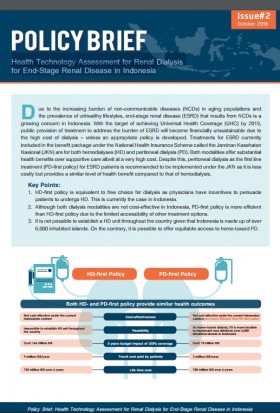This website uses cookies so that we can provide you with the best user experience possible. Cookie information is stored in your browser and performs functions such as recognising you when you return to our website and helping our team to understand which sections of the website you find most interesting and useful.
Policy Brief (issue 2) : Health Technology Assessment for Renal Dialysis for End-Stage Renal Disease in Indonesia

รายละเอียดเพิ่มเติม
Due to the increasing burden of non-communicable diseases (NCDs) in aging populations and the prevalence of unhealthy lifestyles, end-stage renal disease (ESRD) that results from NCDs is a growing concern in Indonesia. With the target of achieving Universal Health Coverage (UHC) by 2019, public provision of treatment to address the burden of ESRD will become financially unsustainable due to the high cost of dialysis – unless an appropriate policy is developed. Treatments for ESRD currently included in the benefit package under the National Health Insurance Scheme called the Jaminan Kasehatan Nasional (JKN) are for both hemodialyses (HD) and peritoneal dialysis (PD). Both modalities offer substantial health benefits over supportive care albeit at a very high cost. Despite this, peritoneal dialysis as the first line treatment (PD-first policy) for ESRD patients is recommended to be implemented under the JKN as it is less costly but provides a similar level of health benefit compared to that of hemodialysis.
Key Points:
1. HD-first policy is equivalent to free choice for dialysis as physicians have incentives to persuade patients to undergo HD. This is currently the case in Indonesia.
2. Although both dialysis modalities are not cost-effective in Indonesia, PD-first policy is more efficient than HD-first policy due to the limited accessibility of other treatment options.
3. It is not possible to establish a HD unit throughout the country given that Indonesia is made up of over 6,000 inhabited islands. On the contrary, it is possible to offer equitable access to home-based PD.




